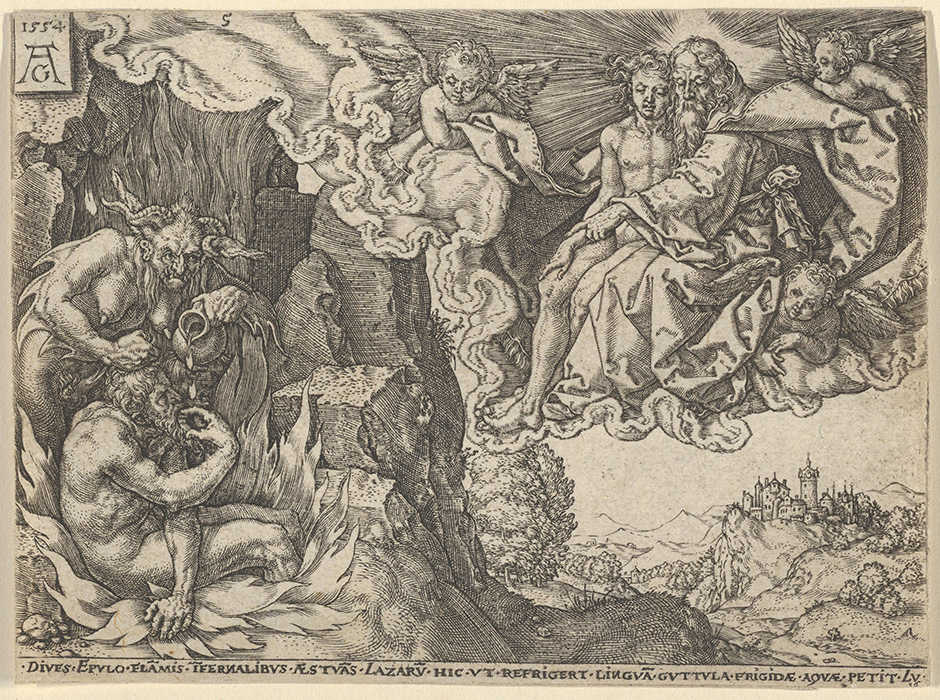
A tent is seen at a homeless encampment near the Kennedy Center in Washington Aug. 11, 2025. (OSV News/Reuters/Ken Cedeno)
Some people think newborns can't really see. But actually, their task is to learn to focus on objects both near and farther away. Both sight and hearing develop as we learn to block some of the things we hear and see so that we can concentrate on what is important at hand. Although we may not think of it, both hearing and seeing have a great deal to do with our intentions and priorities. That's what today's readings are all about.
Today, we hear Amos berate the wealthy whose only focus is their own comfort and enjoyment. Our opening line says it all: "Woe to the complacent!" They have obtained all the luxury they could have imagined and can dance to their own tune. They ignore the fact that things are falling apart around them and people are suffering. Disaster has not yet hit them and they think it never will. What Amos says in prose, Jesus tells as a parable people love to hear — until it reveals them to themselves.
When we call today's parable "Lazarus and a rich man," we've already revealed its key message: Lazarus has a name, a dignified designation, and the wealthy man gets defined — perhaps as he defines himself — by what he has; he seems to be no more than a seeker of self-satisfaction.
As Jesus spins his tale, he describes the rich man's overabundance. He had all he wanted, a life that most folks in Jesus' audience could hardly imagine. Then he portrayed Lazarus in dreadful misery. When Lazarus died, Father Abraham took him on his lap like a parent comforting a sad, injured child. The rich man received all that he had ever given: nothing but grief.
Now at last, the once wealthy one sees what could have been: a beggar consoled and loved. In life, that rich man had dug the chasm separating him from anyone beneath his consideration. He had not crossed over into the zone of compassion, so he could never take up residence there.
Interestingly, Jesus doesn't claim that the beggar was without sin. He only said that Lazarus lived in appalling conditions. As if his wounds and hunger were not enough, the only attention he received was from dogs, ritually unclean animals. Until he reached the afterlife, Lazarus knew he was invisible to many and disdained by others. Somewhat like the suffering servant in Isaiah 53, he was someone from whom people turned their faces, whom they spurned and avoided. He deserved rest in Abraham's bosom simply because he needed it, nothing more.
Even after death, the rich man observing Abraham and Lazarus remained blind to Lazarus as a fellow human being. Now, rather than being blind to him, he saw him as a potential servant who might ease his discomfort. The closest the pitiable man ever got to expressing compassion came when he begged for a message to his brothers. With that, Abraham told him that if they couldn't or wouldn't listen to Scripture, nothing could bail them out of their prison of complacent egoism. Not even a resurrection — be it of Lazarus or Jesus himself.

"The Rich Man in Hell, Seeing Lazarus Embraced by Abraham," from "The Parable of the Rich Man and Lazarus," a 1554 engraving by Heinrich Aldegrever (Metropolitan Museum of Art)
This is where Paul's message to Timothy comes in. Paul says, "Lay hold of eternal life, to which you were called." Paul is not talking about a future place in the bosom of Abraham. He's talking about the very day on which Timothy read his words. Paul believes that eternal life has already begun for those who live in Christ. Their care for one another, their ability to see as Jesus did, and their compassion for anyone in need ushers them into the reign of God here and now. At the same time, it's not a done deal. Paul tells us we must compete or strive well for the faith. The reign of God is not a destiny, but a way of living with and for others.
Advertisement
A few years ago, as I was getting on a highway, I saw a man that greatly resembled a nephew of mine who was lost in drink and drugs and disillusion. I quickly switched lanes to check him out. It wasn't my nephew. As I drove on, I wondered. What if it had been him? What would I have done? And when it wasn't he, what might I have done anyhow?
Today's readings are meant to provoke us to sharpen our senses and sensitivity. Jesus' parable asks us to judge where we choose to focus and what we intentionally block out. What do we see when we pass a beggar? Do we even notice the amount of plastic we throw away or the water we let run unnecessarily? When we see need, do we evaluate the one in need or our own response?
Who and what can we not afford to ignore?
